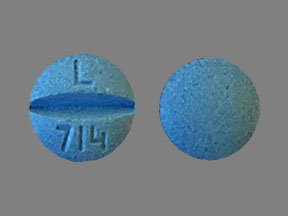
Nadolol Coupons & Savings Card – Discount Prices from $39.26
Generic for: Corgard
Nadolol, also known by its brand name Corgard, is a medication primarily used to manage high blood pressure (hypertension) and chest pain (angina). It can be taken on its own or alongside other drugs to effectively treat these conditions. By lowering high blood pressure, Nadolol helps in reducing the risk of strokes, heart attacks, and kidney issues. For patients with angina, it can decrease the frequency of chest pain episodes and enhance exercise capacity. As a non-selective beta blocker, Nadolol works by slowing the heart rate and relaxing blood vessels, which alleviates pressure on the cardiovascular system and reduces heart strain. This medication is typically administered orally once a day, with or without food. Some common side effects include dizziness and fatigue. Always consult a healthcare professional before starting or changing your medication regimen.
Our coupons are free to use. Before paying, show the pharmacist your Nadolol savings card to get your free discount. Use our filters below to edit the prescription box to match your needs. The Nadolol prices will update based on your prescription needs. Above our Nadolol coupons, you can change your location to see pharmacy prices and costs in other areas. We're here to help you buy Nadolol at the lowest price with our prescription discount card.
My prescription
Edit
80MG, Nadolol (90 Tablets)
Select pharmacy

CVS
$42.00
COUPON PRICE
Albertsons
$39.26
COUPON PRICE
Walgreens
$45.09
COUPON PRICE
Walmart
$54.80
COUPON PRICENadolol savings card
Show this card to your pharmacist
Albertsons
$39.26
BIN
ID
PCN
GRP
019876
LHDEC1BBA6
CHIPPO
LHX
Powered by
Nadolol, also known by its brand name Corgard, is a medication primarily used to manage high blood pressure (hypertension) and chest pain (angina). It can be taken on its own or alongside other drugs to effectively treat these conditions. By lowering high blood pressure, Nadolol helps in reducing the risk of strokes, heart attacks, and kidney issues. For patients with angina, it can decrease the frequency of chest pain episodes and enhance exercise capacity. As a non-selective beta blocker, Nadolol works by slowing the heart rate and relaxing blood vessels, which alleviates pressure on the cardiovascular system and reduces heart strain. This medication is typically administered orally once a day, with or without food. Some common side effects include dizziness and fatigue. Always consult a healthcare professional before starting or changing your medication regimen.
Our coupons are free to use. Before paying, show the pharmacist your Nadolol savings card to get your free discount. Use our filters below to edit the prescription box to match your needs. The Nadolol prices will update based on your prescription needs. Above our Nadolol coupons, you can change your location to see pharmacy prices and costs in other areas. We're here to help you buy Nadolol at the lowest price with our prescription discount card.
More prescriptions for hypertension
coupons from$226.89Save 72%
coupons from$17.71Save 92%
coupons from$7.02Save 91%
coupons from$18.60Save 74%
coupons from$66.15Save 38%
coupons from$15.56Save 71%
coupons from$20.94Save 91%
coupons from$54.77Save 48%
More prescriptions for hypertension
Coreg Cr Save 72%coupons from $226.89
Nifedipine ER Save 92%coupons from $17.71
Quinapril Save 91%coupons from $7.02
Spironolactone Save 74%coupons from $18.60
Acebutolol Save 38%coupons from $66.15
Benazepril Save 71%coupons from $15.56
Enalapril Save 91%coupons from $20.94
Amiloride-hydrochlorothiazide Save 48%coupons from $54.77
Nadolol dosage forms
Use our Nadolol 20MG coupon with prices from $2.69 for 1 Tablet. You can also use our Nadolol 20MG coupon with prices from $8.18 for 30 Tablets. We have a Nadolol 20MG coupon with prices from $26.03 for 90 Tablets. You can use our Nadolol 20MG coupon with prices from $27.92 for 100 Tablets.
Dosage Quantity Price from Per unit 20MG 1 Tablet $2.69 $2.69 20MG 30 Tablets $8.18 $0.27 20MG 90 Tablets $26.03 $0.29 20MG 100 Tablets $27.92 $0.28 20MG 1000 Tablets $101.30 $0.10 40MG 1 Tablet $2.84 $2.84 40MG 30 Tablets $12.59 $0.42 40MG 90 Tablets $36.00 $0.40 40MG 100 Tablets $37.08 $0.37 40MG 1000 Tablets $134.10 $0.13
| Dosage | Quantity | Price from | Per unit |
|---|---|---|---|
| 20MG | 1 Tablet | $2.69 | $2.69 |
| 20MG | 30 Tablets | $8.18 | $0.27 |
| 20MG | 90 Tablets | $26.03 | $0.29 |
| 20MG | 100 Tablets | $27.92 | $0.28 |
| 20MG | 1000 Tablets | $101.30 | $0.10 |
| 40MG | 1 Tablet | $2.84 | $2.84 |
| 40MG | 30 Tablets | $12.59 | $0.42 |
| 40MG | 90 Tablets | $36.00 | $0.40 |
| 40MG | 100 Tablets | $37.08 | $0.37 |
| 40MG | 1000 Tablets | $134.10 | $0.13 |
| 80MG | 90 Tablets | $39.26 | $0.44 |
| 80MG | 30 Tablets | $17.77 | $0.59 |
| 80MG | 100 Tablets | $41.96 | $0.42 |
| 80MG | 1000 Tablets | $200.70 | $0.20 |
